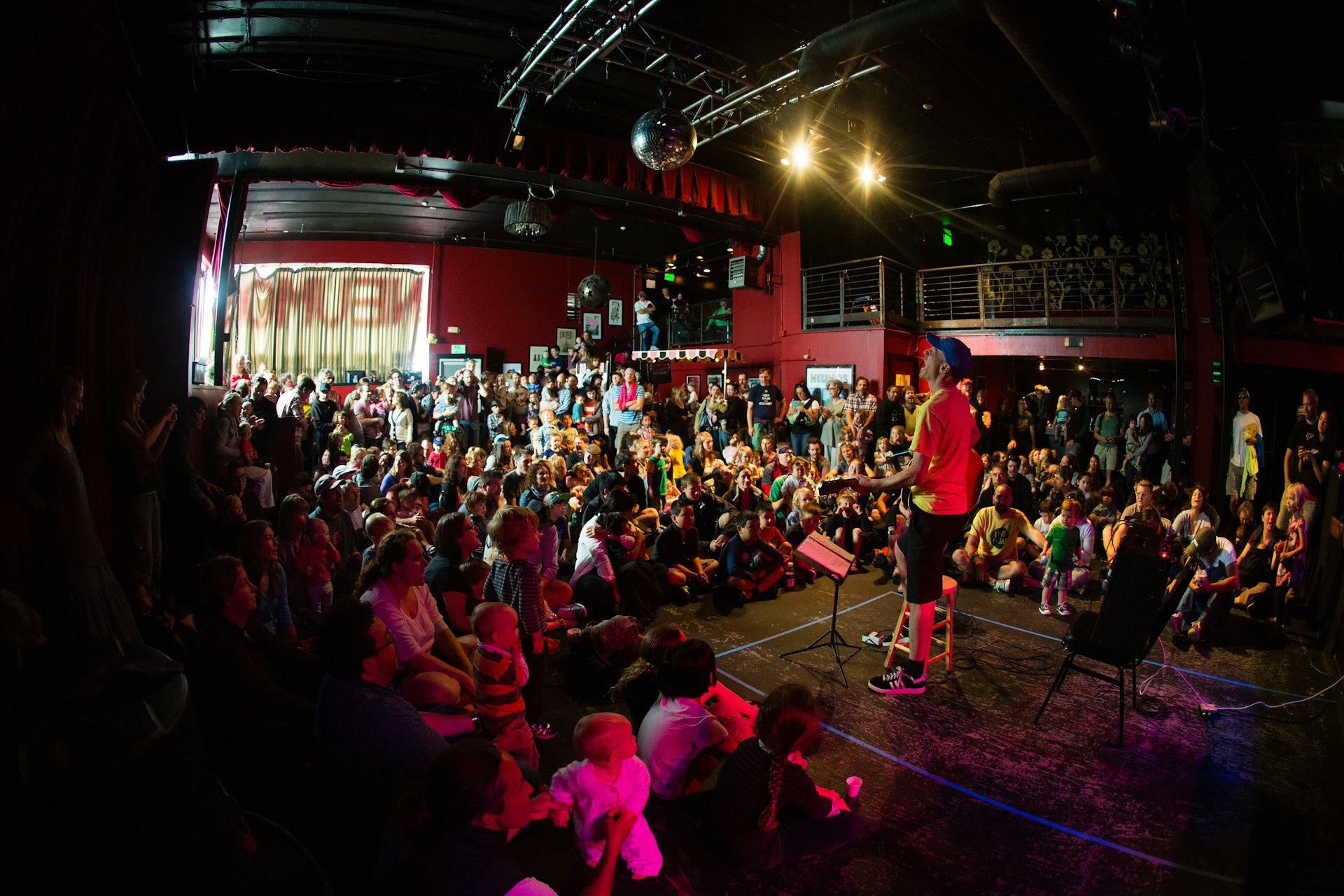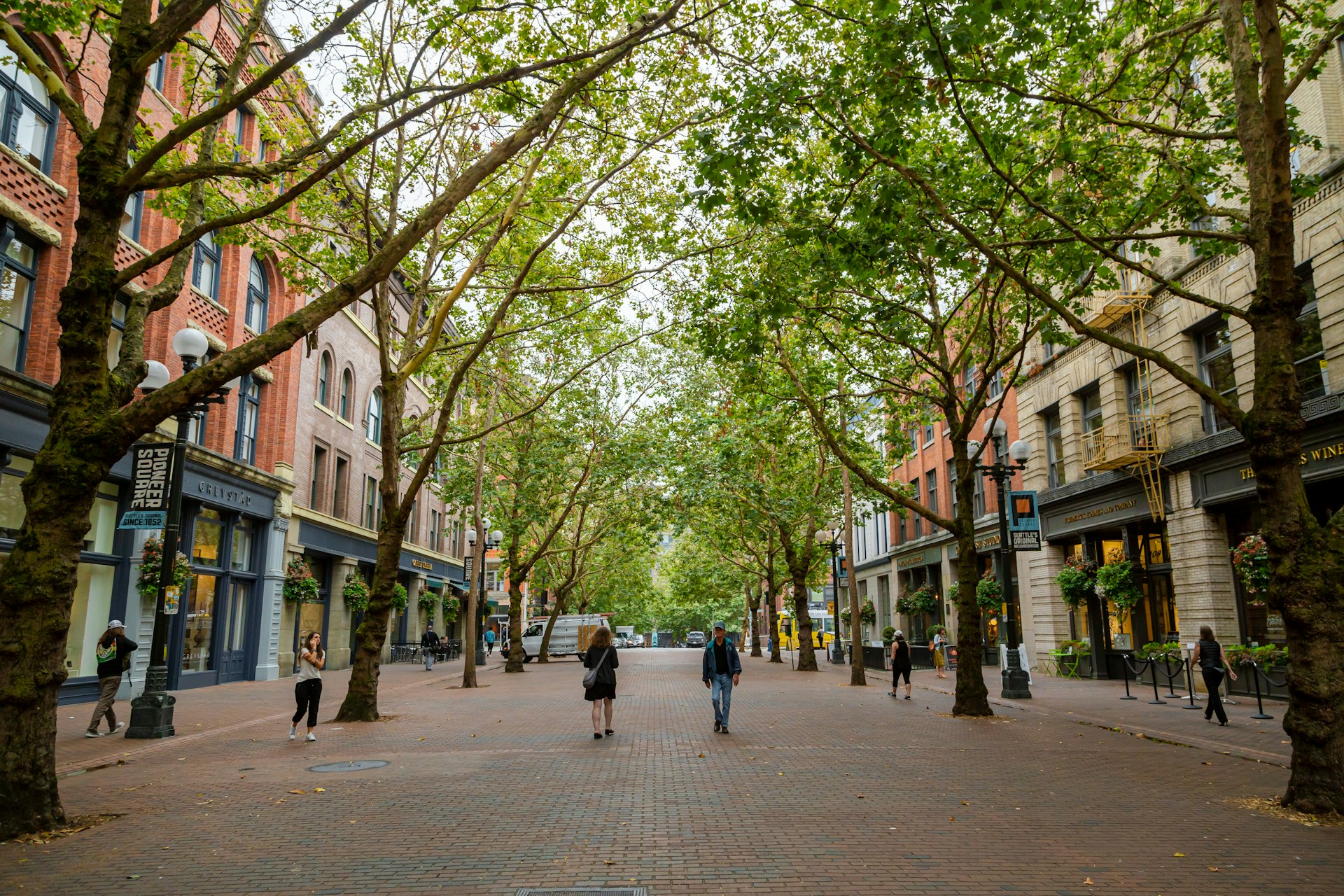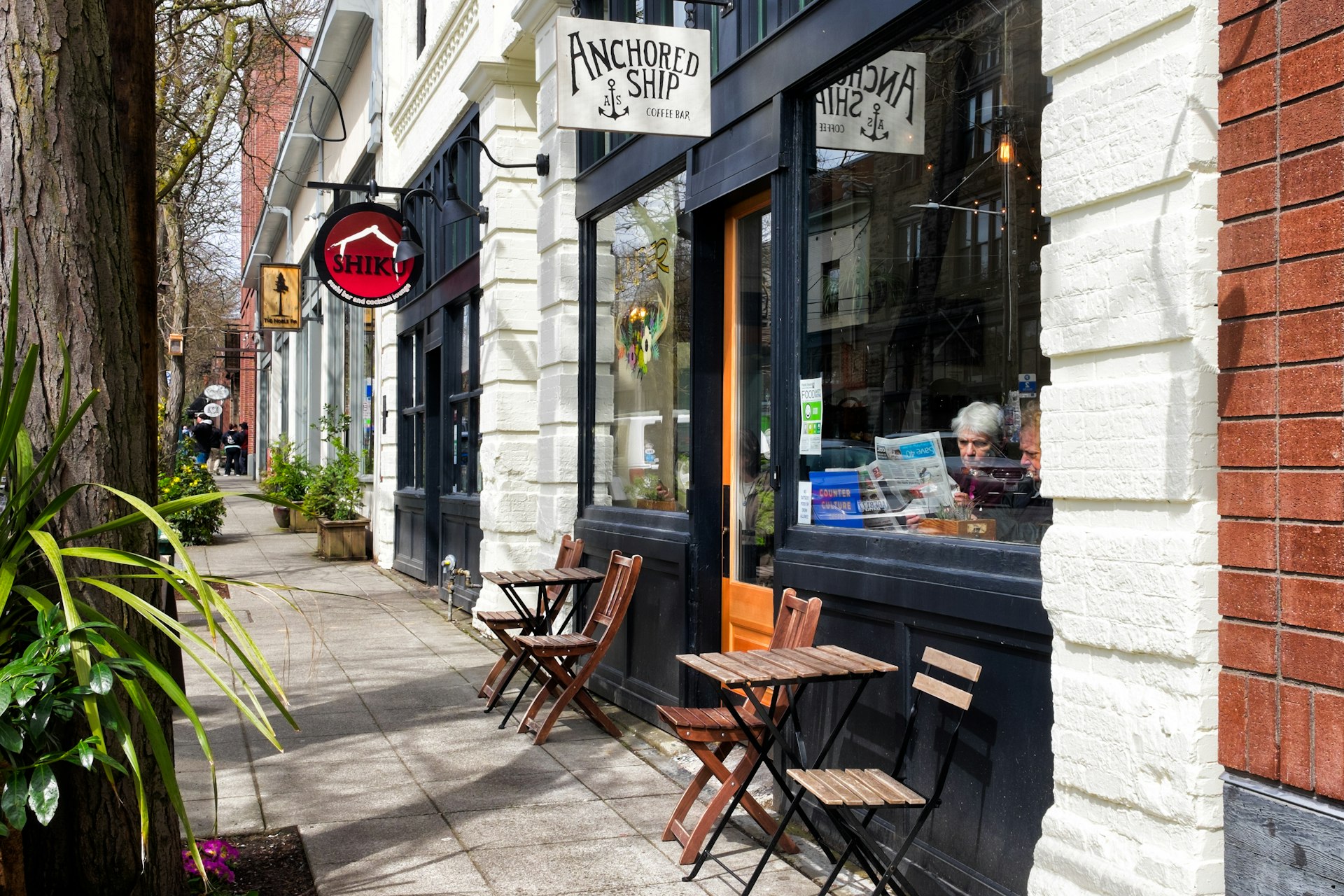Like most big cities, what side of Seattle you’ll see depends on where you visit. Each neighborhood has something unique to offer, whether you want to see the sights, try the local food scene, check out the local bands or browse interesting shops.
Having a basic idea of the best Seattle neighborhoods will make any trip infinitely easier. Go to Queen Anne for spectacular views, Capitol Hill for the nightlife, Fremont for quirky art, Ballard for the food scene, Seattle Center for the sights and the U District for shopping.
You might not get to all of Seattle’s top neighborhoods in one visit, but here are the best spots to start your explorations.
Indulge in the food scene in Ballard
A former seafaring community with Nordic heritage, Ballard still feels like a small town engulfed by a bigger city. Ballard has come into its own as one of the best food neighborhoods in Seattle, filled with exciting restaurants, lively bars and excellent shopping.
The commercial heart of Ballard stretches out on either side of NW Market St between roughly 14th Ave NW and 32nd Ave NW, which is lined with an expanding selection of eateries, shops, and nightlife, though some local faves like pizza joint Delancy and its sibling bar Essex spill outside those boundaries.
You can find everything from American cuisine at Sawyer to fresh seafood at The Walrus and the Carpenter to Oaxacan flavors at La Carta de Oaxaca. In a nod to Ballard’s Scandinavian heritage, quaff some mead at Skål Beer Hall a few blocks east of the National Nordic Museum.
The blocks closer to the water contain many of the neighborhood’s most charming historic buildings, now home to a bevy of modern offerings, including some of the best shopping in the city. The neighborhood’s far west side is bordered by the Puget Sound and has staggering views of the water and Olympic Peninsula.
On the southwestern edge, you’ll find the historic Hiram M Chittenden Locks, from where you can continue south over the water to the hiking trails of Discovery Park.
Don’t miss the unconnected western section of the recreational Burke-Gilman Trail that stretches from the Hiram M Chittenden Locks out to Golden Gardens Park (1.75 miles) and takes in a different, quieter side of Ballard that faces the open Sound.
Planning tip: Due to the distance from the city center attractions, Ballard isn’t the best option for accommodations if you’ve never been to Seattle. Still, the neighborhood has a handful of good options, including Ballard Inn.

Enjoy the nightlife in Capitol Hill
To decipher Seattle’s most diverse, fashionable and consciously cool neighborhood, it’s helpful to understand a little of its geography. Capitol Hill has three main commercial strips worth exploring: Broadway (the main drag), 15th Ave and the ultra-cultural Pike–Pine corridor, which are all refreshingly walkable if you don’t mind hills.
Geographically, the strips are gelled together by Capitol Hill’s residential grid: a mixture of apartment complexes, large grandiose houses and the green expanse of Volunteer Park with its uniquely photogenic vantage points of the Space Needle.
This weird but never caustic juxtaposition of chic and scruffy is one of the neighborhood’s biggest allures and makes Capitol Hill one of the best walking neighborhoods in Seattle.
If you’re walking up from downtown crossing I-5 on E Pine St, you’ll enter the neighborhood close to Melrose Market at the western end of the Pike–Pine corridor. This stretch of aging brick warehouses and former 1950s car dealerships made over into LGBTQI+ bars, live music clubs, coffeehouses, record stores and fashionable restaurants is Seattle’s nightlife central.
Running perpendicular to Pike–Pine is Capitol Hill’s main commercial street, Broadway. Several blocks east is the quieter business district of 15th Ave E, where some of the city’s wealthiest residents live in the grand old mansions that embellish tree-lined streets such as 14th Ave (aka Millionaire Row).
Gaze at the opulence as you make your way up to Capitol Hill’s peak, Volunteer Park, home to the Seattle Asian Art Museum, a conservatory and a water tower. In the neighboring Lake View Cemetery, you’ll find the graves of Bruce and Brandon Lee.
Planning tip: Capitol Hill is a good option if you want to stay near the action and don’t need absolute quiet at night. The neighborhood has plenty of guesthouses and vacation rentals.
Get a little weird in Fremont
Weirder than Ballard and more self-deprecating than Capitol Hill, Fremont’s essential businesses are its public sculptures. Most of its outlandish statues and monuments lie clustered around a few square blocks on the neighborhood’s southern edge close to the bridge, roughly between the water and NW 36th St, stretching to Aurora Ave N and Phinney Ave N.
Here, you’ll also find the bulk of the notable eating places like Lupo, offbeat boutiques, and the cheaper and more interesting one of Fremont’s two hotels, Hotel Hotel. (The other is a chain hotel farther north on Aurora Ave).
Fremont is a great neighborhood for getting a taste of local life, especially in summer, when festivals and regular outdoor movies send the locals positively delirious.
Planning tip: With good bus connections and a bike-friendly intra-urban trail, it can easily be incorporated with visits to the adjacent neighborhoods of Ballard and Wallingford.
See the sights in Belltown and Seattle Center
Where industry once roared, glassy condos now rise in the thin, walkable strip that is Belltown. Belltown is near the Seattle Center, the former site of the legendary 1962 World’s Fair that has tons of the city’s top things to do, such as the Space Needle, Museum of Pop Culture and Chihuly Garden and Glass. The green lawns and fountains attract gawking tourists and families looking for a retreat from the bustle of downtown.
Belltown has gained a reputation as one of the best nightlife neighborhoods in Seattle in its 1990s grunge heyday. These days it’s more renowned for its 100-plus restaurants.
A few of the grunge-era landmarks are still in business, but distorted guitars now compete with the chatter of the cocktail crowd. Whatever your fashion affiliations, Belltown’s after-dark scene is hip and noisy and rarely stands still.
Capitol Hillers might disagree, but Belltown’s main nightlife zone (1st and 2nd Aves between Blanchard and Battery Sts) is still the best place in the city to string together a bar-hopping evening out.
Belltown is right on the water, and this is where you’ll find the ferries to the San Juan Islands and Victoria, British Columbia. Its southernmost corner borders the Pike Place Market.
Planning tip: Belltown is a great option for staying if you’re a first-time visitor to Seattle. It’s not the quietest neighborhood in the city, but it offers plenty of places to stay, from waterfront hotels with their own place in rock history to hip and (allegedly) haunted bargains.

Do it all at Pioneer Square, International District and SoDo
Browsing the Pioneer Square Historic District is like visiting a movie set of early 20th-century Seattle, except the food and the shopping are better. This area is the birthplace of Seattle, and the red-brick district of historical buildings, antique shops and musty bars are still a real crossroads of the modern city.
Some visitors arrive by long-distance bus or train at King Street Station, a good place to get oriented thanks to its proximity to a trio of local squares. A few blocks west of the station and east of the Pier 50 Seattle Dock is Pioneer Square Park, an architectural showpiece.
Nearby Occidental Park was given a beautiful facelift and has become a favorite spot with locals. A block down the street and around the corner from Occidental Square, Zeitgeist Coffee will brew your first (and possibly best) cup of Seattle coffee. Take time to wander the streets afterward to admire the handsome architecture.
To the east of King Street Station is the International District (ID), Seattle’s de facto Chinatown. The “international” moniker has some merit. While predominantly Chinese, the district has a strong Vietnamese presence and a few reminders of the city’s Japantown, which has never recaptured its pre-WWII vibrancy after its citizens were detained in internment camps during the war.
The ID is the perfect spot for inexpensive food: dim sum and Vietnamese pho predominate. You’ll also find the Wing Luke Museum and the delectable Panama Hotel Tea & Coffee House. Hidden treasures include everything from a massive Japanese department store to a pinball museum.
Access spread-out SoDo (South of Downtown) by strolling south on 1st Ave S. Beyond its two sports stadiums, you’ll stumble upon rugged bars, weed dispensaries, the Westland whiskey distillery and a little-known computer museum founded by Paul Allen.
Planning tip: This part of Seattle offers little in terms of accommodations other than a couple of chain hotels, but you never have to walk more than a few blocks to find public transport connections to places to stay downtown.

Take in the skyline views in Queen Anne and Lake Union
At some point during your Seattle sightseeing sojourn, you’ll want to exit the tourist-heavy Seattle Center and be deposited on one of the busy thoroughfares of Lower Queen Anne, a lived-in urban locale good for a cheap meal or an eye-widening dose of Seattle coffee culture.
To get a view of a posher side of the neighborhood, take a steep hike (or jump on a bus) up Queen Anne Ave N, aka “the Counterbalance,” to a markedly different neck of the woods and some of the best views of the Seattle skyline.
East of Queen Anne is the freshwater lake known as Lake Union, perfect if you’re in the mood for a paddle. Because Queen Anne and the neighborhoods around Lake Union are mainly residential, there’s little to be had in terms of accommodations, and the rates of what’s available are in line with some of Seattle’s most affluent neighborhoods.
Hang out with the family in Georgetown and West Seattle
Located south of downtown and its industrial extension, SoDo, the neighborhoods of Georgetown and West Seattle feel detached from the center by the glassy expanse of Elliott Bay and SoDo’s utilitarian warehouses.
These are two of the best neighborhoods in Seattle for families, but because transportation connections to downtown are better than those between the neighborhoods, they’re often visited separately. Georgetown’s art walks, punk scene and quirky stores can be incorporated with a visit to the Museum of Flight.
West Seattle works as a summer-weekend beach getaway courtesy of sandy Alki Beach. Spread over a hilly peninsula, the neighborhood spins on two hubs: the de facto downtown called “the Junction” at the intersection of California Ave SW and SW Alaska St (whose indie record store, one-in-a-million bakery and smattering of great restaurants make worth the visit) and the aforementioned famous beach and its promenade. Free shuttles from the water-taxi dock connect with both.
Planning tip: Neither Georgetown nor West Seattle have much to offer in terms of accommodations. You’re better off staying downtown or heading farther south to the chain hotels around Sea-Tac Airport.
Go shopping in the U District
Head east off I-5 north of Lake Union and suddenly you’ll feel as if you’re no longer in Seattle. The U District, named for “U Dub” (what locals call the University of Washington) feels like its own little college town. Just like you, most of the people here are visitors – they’re merely staying a bit longer (several semesters or more).
Nearly everyone gets oriented in the U District on “the Ave” (University Way, roughly between 40th and 50th Sts), an atmospheric main drag full of tiny cheap restaurants, thrift stores, record stores, secondhand bookstores – this is one of the best shopping neighborhoods in Seattle – as well as tattoo parlors, bars and coffee shops full of deadline-chasing, laptop-gazing students.
The number of inexpensive places to eat, especially Indian and southeast Asian cuisines, makes the Ave the best place to find a budget-friendly and tasty meal. If you want to head inside, lose yourself in the cavernous University Book Store, which takes up an entire city block.
Reserve a sunny day to explore the adjacent UW campus, a veritable arboretum and architectural showcase with a couple of top-notch museums focusing on art and natural history.
The U District has a good range of hotels, from surprisingly expensive chain hotels to more affordable options full of character, like the College Inn.
Local tip: Rowdy college students on the way back from a night of debauchery may keep you awake at night.
